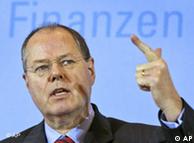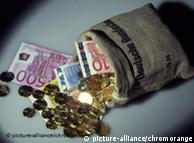Finance | 11.04.2009
German finance minister warns of global inflation threat
"There is so much money being pumped into the market that there could be a threat of an overloading of the capital markets and worldwide inflation when an economic recovery comes," Steinbrueck was quoted in an interview for the mass circulation newspaper Bild, published on Saturday, April 11.
In the short-term, Steinbrueck said there was no danger, but in the medium-term "we'll have to see how we can remove the billions in liquidity from the market that we're now pumping into the economy." According to the minister, the crisis could present a major challenge to central banks, including the European Central Bank.
Steinbrueck said there was no alternative to the "sensible" stimulus packages that some governments are using to combat the economic downturn. At the same time, he voiced concern "the next crisis is being pre-programmed because of all the enormous debt-financed countermeasures being conducted worldwide."
What is to be done?
 Bildunterschrift: Großansicht des Bildes mit der Bildunterschrift: The German finance minister is worried about what will happen after the crisis
Bildunterschrift: Großansicht des Bildes mit der Bildunterschrift: The German finance minister is worried about what will happen after the crisis
Meanwhile, calls from trade unions were growing louder for new government programs to lessen the economic ills of millions of Germans.
New investment programs would cost more money and raise public-debt levels but "whoever scrimps now will pay a much higher price later," wrote the head of the Verdi labor union, Frank Bsirske, in an op-ed for the Saechsische Zeitung newspaper.
Some economists, however, are weary of launching an additional package of government investments and agree with the finance minister that the large sums of money currently on the market must be removed once a recovery begins.
According to tax and finance expert Ralph Brügelmann, it is not completely unjustified that many Germans are worried about inflation, but there should be no concern of hyperinflation.
Brügelmann told Deutschlandradio Kultur that once property prices and bank stocks rose, and banks again lent money to each other, then the central banks would have to slowly take out the money pumped in.
Official figures released in Germany this week showed inflation in March slowed to 0.5 percent, the lowest since July 1999.


No comments:
Post a Comment